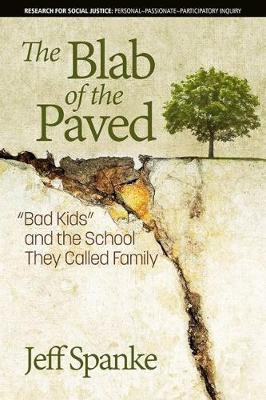Research for Social Justice: Personal - Passionate - Participatory Inquiry
1 total work
This narrative ethnography adopts an aesthetic lens to relay the various lived experiences of a non-traditional, Midwestern public high school during its final year in its original building. Extending upon previous research of high school dropouts, I examine how this one particular high school incorporated a self-paced curriculum with a focus on "family" to address the unique learning needs of students at risk of not graduating. By employing elements of grounded theory, narrative inquiry, and autoethnography, I share the stories of Walgut High School's (a pseudonym) roughly sixty students as they struggle to navigate their respective roles in a dominant cultural narrative to which they've never felt like they belonged. Through the extensive and organic voices of the primary participants-as well as my observations of my own participation in the school culture over the course of a year-this project serves to offer insights not only into the school experiences of marginalized adolescents, but also into Walgut's myriad successes and failures. In particular, this piece highlights the vitality of unconditionally caring or "hospitable" teachers (Derrida, 2000), while ultimately questioning the presumed utility of a high school diploma. The story concludes not by lauding the alternative mine created for Walgut's canaries, but by questioning the purpose and stability of all scholastic minds.
As American schools continue making strides to accommodate and support the complex and oftentimes contradictory needs of their students, what it means to succeed as a teacher in (and prepare teachers for) these diversified, inclusive learning spaces is growing increasingly complicated. Indeed, given the shifting paradigm of American public education, teacher preparation programs must continue to adapt their practices and philosophies in order to equip their teacher candidates with the skills needed not only to thrive but also find purpose and meaning in schools similar to this project's Walgut. While this book doesn't claim to offer any answers to the myriad questions concerning the future of public schools, it does endeavor to offer a springboard from which all education stakeholders can continue engaging in healthy and productive discussions of how best to prepare students (and teachers) for autonomous, democratic, curious, creative, and compassionate citizenship both in and apart from their academic communities. To this end, rather than write from a detached, traditionally academic vantage, I have sought in these pages to compose from a personal (albeit limited), passionate (albeit subjective) and participatory (albeit someone marginalized) perspective. In my pursuit of social justice for the characters of Walgut High School, I begin first by exposing my own privileged role in perpetuating injustice. Only through recognizing and naming our own demons can we ever begin to exorcize the System writ large. Thus, in this book's lack, there is possibility; in its futility, hope.
As American schools continue making strides to accommodate and support the complex and oftentimes contradictory needs of their students, what it means to succeed as a teacher in (and prepare teachers for) these diversified, inclusive learning spaces is growing increasingly complicated. Indeed, given the shifting paradigm of American public education, teacher preparation programs must continue to adapt their practices and philosophies in order to equip their teacher candidates with the skills needed not only to thrive but also find purpose and meaning in schools similar to this project's Walgut. While this book doesn't claim to offer any answers to the myriad questions concerning the future of public schools, it does endeavor to offer a springboard from which all education stakeholders can continue engaging in healthy and productive discussions of how best to prepare students (and teachers) for autonomous, democratic, curious, creative, and compassionate citizenship both in and apart from their academic communities. To this end, rather than write from a detached, traditionally academic vantage, I have sought in these pages to compose from a personal (albeit limited), passionate (albeit subjective) and participatory (albeit someone marginalized) perspective. In my pursuit of social justice for the characters of Walgut High School, I begin first by exposing my own privileged role in perpetuating injustice. Only through recognizing and naming our own demons can we ever begin to exorcize the System writ large. Thus, in this book's lack, there is possibility; in its futility, hope.
